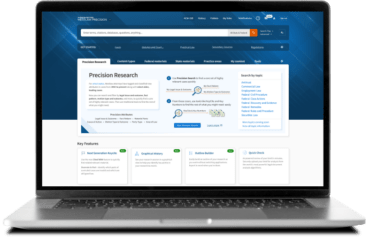Research is a critical part of the legal process, and it can be time-consuming and tedious. But it doesn’t have to be.
Mark Frongillo, Thomson Reuters Law School Account Manager said in a recent white paper, “The problems legal researchers are solving haven’t changed significantly in the past thirty years. What has changed are the tools they have to solve the problems.”
And he is right. While the steps in traditional legal research processes may be the same as they’ve always been, technology has come a long way in optimizing how legal researchers get their work done efficiently and accurately.
With the right technology and process optimization, you can find the right answers faster than ever before.
Below are some ways that your legal research process could be optimized.
Jump to:
| Finding that one case with more efficiency |
| Optimize your workflows |
| Use tools that work with artificial intelligence |
| Have you accidentally cited bad law? |
| Little adjustments can make big impacts |
Finding that one particular case with more efficiency
Finding that one particular case is a challenge that legal researchers often face. When dealing with thousands of potentially relevant cases, it can be difficult to find exactly what you’re looking for without having to sort through mountains of information. Modern technology such as Precision Research within Westlaw Precision with CoCounsel reveals important case attributes which allow you to search, filter, and browse more efficiently than ever before. You can run searches that gather all the potentially relevant cases, then filter your results by legal issue, fact pattern, motion type, outcome and much more; saving you from having to sift through hundreds or thousands of irrelevant cases just to find what you’re looking for.
And when it comes down to the most difficult research – when there is no case on point – Precision Research not only helps you know faster but also lets you expand your view by finding similar cases which might address the same issue in different contexts or involve different facts patterns which could come out differently due to different material facts.
Optimize your workflows
When was the last time you checked in on your workflow process? There may be simple ways to refine these and get work done faster and with more organization.
Outline Builder, a capability within Westlaw Precision with CoCounsel, is designed to help researchers transition from researching to drafting with ease. With Outline Builder, users are able to quickly build outlines without leaving the tool. Additionally, they are able to drag and drop important text or citations into their outline, which will automatically include linked and formatted citations, as well as KeyCite flags.
Graphical View of History is another helpful tool that provides a graphical visualization of research history. This feature maps out the steps taken by a researcher throughout their process, along with searches and documents interacted with so that users can easily identify which viewed documents were most important during their search.
Lastly, Keep List/Hide Details allows researchers to save cases of interest while simultaneously hiding those they don’t wish to see again. This feature helps streamline future research by allowing users to quickly access relevant information from previous sessions without having to sift through irrelevant material again and again.
Say goodbye to multiple tabs and re-reviewing information.
Use tools that work with artificial intelligence
With the integration of AI in legal research technology, the process is becoming even more automated and efficient. Westlaw, for example, utilizes machine learning to create predictive models that can anticipate user needs and suggest relevant content before a researcher has to search for it. Additionally, machine learning algorithms are employed to predict which documents a researcher might be interested in based on their previous searches. This means researchers don’t have to manually scan through pages of irrelevant material – they get the most relevant results right away.
AI technologies have been making legal research easier and more cost-effective than ever before. By leveraging technology backed by the power of machine learning and natural language processing tools, legal researchers can refine their processes and get their answers quicker.
“Superior AI really requires three things: domain expertise, quality data, and AI experts. Fortunately for us, Thomson Reuters is uniquely positioned as having superiority in all three areas.”
– C.J. Lechtenberg, Senior Director of Westlaw Product Management
 | See more on how Thomson Reuters informs the way forward with artificial intelligence. |
Have you accidentally cited bad law?
As legal researchers, it is essential to use technology that keeps up with the evolving law. Out-of-date methods of research can lead to out-of-date results, which in turn could lead to inaccurate and incomplete conclusions. To ensure that your research is up-to-date and comprehensive, look for technology solutions that keep pace with the ever-changing legal landscape.
By leveraging cutting-edge technologies, researchers can stay on top of the latest developments in the law and ensure they are citing the most up-to-date information available when crafting their own arguments. Keeping abreast of new case law and other changes in legislation is key for legal professionals who wish to stay ahead of their competition. Smart technology solutions can make this process easier by automatically scanning millions of pages of content for relevant updates, saving valuable time so you don’t have to read through long documents yourself.
Little adjustments make big impacts
Taking a step back from your day-to-day work can give you space to see where you can refine your strategies and processes. Keeping a modern approach to your legal research is essential to ensure you get the right information for your clients, stay ahead of your competition and feel confident that you did your best work.
Hear how modern legal tools such as Westlaw Precision with CoCounsel and Practical Law help this Counsel improve his research and stay at the forefront of innovation.











